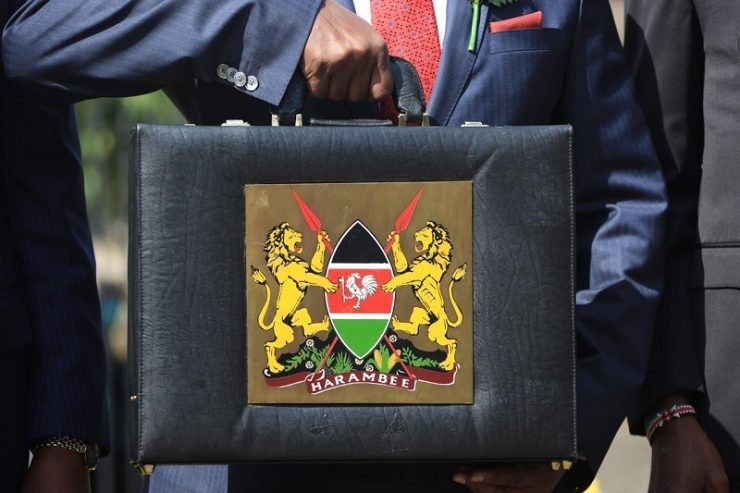- Global ratings agency S&P downgrades Kenya from “B” to “B-” on weaker debt trajectory.
- S&P says Kenya’s financial outlook has deteriorated following the rejection of Finance Bill 2024, which was intended to raise tax revenues.
- Agency projects that Kenya’s budget deficit will widen by almost two percentage points, reaching 4.3% for the 2025 fiscal year.
S&P Global Ratings has further downgraded Kenya’s credit score, pushing the East African nation’s rating deeper into junk territory. This downgrade follows the government’s decision to reject controversial tax increases in late June that were aimed at addressing fiscal imbalances.
The latest move by S&P places East Africa’s biggest economy’s rating on par with countries such as Egypt and El Salvador.
The rejection of the 2024/2025 Finance Bill, which was expected to introduce several tax increases, has been a pivotal moment for Kenya’s economic trajectory. The bill included tax hikes on essential items such as bread, cooking oil, and car ownership, which were met with strong opposition from the public.
These tax measures were seen as critical for fiscal consolidation and debt management, but their rejection has led to a deterioration in the country’s fiscal outlook.
S&P Global Ratings has projected that Kenya’s budget deficit will widen by almost two percentage points, reaching 4.3 per cent for the 2025 fiscal year. This is an increase from the previous projections, reflecting the impact of the rejected tax measures.
President William Ruto’s government has responded by issuing a supplementary budget focused on spending cuts, but these measures are unlikely to fully offset the revenue shortfall caused by the bill’s rejection.
Kenya’s debt and fiscal challenges
Kenya’s fiscal and debt challenges are further compounded by the nation’s high levels of external debt and large financing needs. Despite the government’s efforts to manage these challenges through budget cuts and increased domestic borrowing, the country’s debt outlook remains precarious.
S&P Global Ratings has warned that debt-servicing costs are expected to remain elevated, with the potential for further fiscal slippage due to ongoing revenue underperformance and higher-than-expected debt-servicing costs.
The rejected Finance Bill was part of a broader strategy supported by the International Monetary Fund (IMF) to put Kenya’s debt on a more sustainable path. However, the failure to implement these tax measures has raised concerns about the government’s commitment to fiscal consolidation.
S&P Global Ratings has indicated that further downgrades could occur if Kenya’s fiscal and debt outlook continues to deteriorate. The rejection of the Finance Bill and the subsequent downgrade by S&P Global Ratings have significant political and economic implications for Kenya.
President Ruto’s decision to reject the bill followed widespread protests, which resulted in the deaths of more than 50 people. The protests were fueled by public anger over the proposed tax hikes, which were seen as disproportionately affecting low-income households.
In response to the protests, President Ruto also dismissed almost his entire cabinet and appointed a new, more broad-based government. This includes members of the opposition, such as former chair of the Orange Democratic Party, John Mbadi, who has been appointed as Cabinet Secretary in the Treasury.
While these appointments may help to ease political tensions, they also present challenges for policy coordination and the implementation of future reforms.
Despite these challenges, Kenya’s economic growth remains relatively robust, driven by a dynamic services-led private sector. The country’s real GDP expanded by 5.0 per cent in the first quarter of 2024, supported by resilience in the agricultural sector and a buoyant tourism industry.
S&P Global Ratings has projected that GDP growth will average 5.5 per cent over the 2024-2027 period, although risks remain, including unfavorable weather conditions and the potential effects of La Niña.
Looking ahead, Kenya’s fiscal trajectory remains uncertain, with significant risks on the horizon. S&P Global Ratings has outlined both downside and upside scenarios for the country’s credit rating. On the downside, Kenya could face further downgrades if external or domestic refinancing pressures mount, particularly if foreign exchange reserves decline or domestic liquidity tightens.
S&P Ratings Agency on Kenya’s fiscal consolidation
The agency has also highlighted the risk of limited progress on fiscal consolidation, which could further raise the government’s already-high interest costs.
On the upside, there is potential for a rating upgrade if Kenya’s external and domestic financing pressures are contained, or if the government demonstrates a renewed commitment to sustainable public finances.
This could be achieved through significant progress in fiscal consolidation, including revenue and expenditure reforms. However, such progress will require strong political will and effective policy coordination, which may be challenging given the current political environment.
Kenya’s economic outlook is also influenced by external factors, including global interest rates, commodity prices, and weather conditions. The country’s external debt remains a key vulnerability, with high exposure to foreign exchange risks. However, Kenya still benefits from concessional funding from official lenders, which provides some stability in its external financing.
S&P’s downgrade of Kenya follows similar actions by other major credit rating agencies. In July, Moody’s cut Kenya’s credit rating further into junk status, signaling increased concerns about the country’s fiscal health and debt levels.
Early August, Fitch also downgraded Kenya’s sovereign rating to “B-” from “B,” causing its dollar bonds to fall in value.
Read also: Finance Bill: Kenyan MPs succumb to public pressure, drop inflicting taxes
